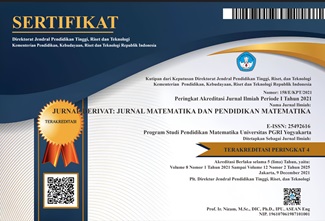Implementasi Focusky Dan Kahoot Membantu Meningkatkan Motivasi Belajar Peserta Didik Terhadap Matematika
DOI:
https://doi.org/10.31316/j.derivat.v7i2.856Abstract
This study aims to determine the implementation of Focusky and Kahoot in increasing motivation to learn SMK students. This research uses descriptive research methods supported by qualitative and quantitative data. The main purpose of descriptive research is to get a detailed picture of a situation while answering questions such as who, when where, and how. The type of descriptive research was chosen because this study aims to describe matters related to the implementation of the Focusky and Kahoot applications in increasing students' motivation towards mathematics in vocational high schools. The subjects in this study were 5 students of class X SMK Al Huda Sariwangi. Data collection techniques used in this study were questionnaires and tests. From the results of the study, it can be revealed that learning by implementing the Focusky and Kahoot applications, in the learning process creates a more interesting, fun, and interactive learning atmosphere so that it has a positive impact on increasing student learning motivation and makes it easier for students to understand the material delivered by the teacher.
Keywords: Focusky, Kahoot, Learning MotivationDownloads
Published
Issue
Section
Citation Check
License
Authors who publish with this journal agree to the following terms:
-
Authors retain copyright and grant the journal right of first publication with the work simultaneously licensed under a Creative Commons Attribution-ShareAlike 4.0 International License that allows others to share the work with an acknowledgment of the work's authorship and initial publication in this journal.
- Authors are able to enter into separate, additional contractual arrangements for the non-exclusive distribution of the journal's published version of the work (e.g., post it to an institutional repository or publish it in a book), with an acknowledgment of its initial publication in this journal.
- Authors are permitted and encouraged to post their work online (e.g., in institutional repositories or on their website) prior to and during the submission process, as it can lead to productive exchanges, as well as earlier and greater citation of published work (See The Effect of Open Access).







